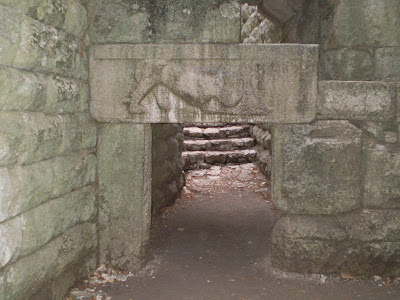Beyond the Lion Gate publication date October 1, 2023. It’s a novel, but the Lion Gate or Porta Luanit is a real place in the south of Albania, part of the classical ruins of Butrint, once a thriving city .
 |
| Ruins of early Christian Basilica, Butrint |
Butrint or Butrinto was given its Latin name Buthrotum, when it was referred to in Virgil’s Aeneid. It may have existed even before ancient Greek times, and continued into Roman & Christian times. The people lived their lives, grew crops, tended animals, sheep, cattle, goats, traded, ate banquets one presumes, definitely watched performances in the theatre, which is still standing today.
 |
| Stage of the amphitheatre, Butrint |
One thing we know they did which we don't do today. If they were afflicted with illness or disease, they would visit the temple of Asklepius, the god of healing dreams. They would prepare themselves for an encounter with the god, in their dreams, by prayer, fasting and ablutions. They were looking not so much for the god to heal them but to be given information on how to heal themselves and also to be given insight into the reasons and situations behind this illness. In other words, illness in those days was seen not just as a material dysfunction but as a malady that may have been some time in the making possibly through imbalances in organs, emotions or beliefs or even through what has been passed on through generations. As well as a physical cure or remedy, the healing could involve an understanding, the meaning of an illness which could make the healing more complete as the patient had the chance to learn from this information and perhaps alter their behaviour so it would not recur.
So Butrint had a temple of Asklepius as well as a theatre and we know from the ruins that exist today it also had an early Christian Basilica and baptistery.
 |
| Ruins of Christian Baptistery |
This once thriving city was largely abandoned, it is thought because of an earthquake. What was left was fought over by Venetian and Ottoman Empires but most of the ruins were covered over and largely forgotten. Some excavations took place in the 1930s, led by an Italian team. But after WWII and during the communist years, little seems to have happened there. It is only since the communist regime fell that excavations have resumed in earnest, Butrint’s importance is internationally recognized, and it is now a UNESCO World Heritage site.
The setting of the novel is Albania in the late 1990s. The country is going through a turbulent time of transition, the infrastructure is broken, and criminal gangs are settling scores in the streets of Tirana. Paula, the narrator, arrives in winter to work for an aid organisation.
Tirana could also be called the city of rumours, as it is often hard to find out the truth about individuals and organisations, including the one Paula works for. It seems that everyone – and soon that will include her – has something to hide. But the country grows on her, the people, the history, and the dramatic landscape. Through a particular relationship Paula experiences the ambiguous nature of love, both its appearance and its reality. Its presence and its absence.
The Lion Gate is a stone threshold, part of the classical ruins of Butrint, in the south of Albania, which Paula visits with one of her friends. It is possible that all portals can alter the perceptions of people who pass through them.
 |
| Porta Luanit, Butrint |
Beyond the Lion Gate is available from me or Fiction Direct at this website price £9 (which includes postage in UK).

Comments
As always, grateful to have found your blog all those years ago.
All the best to you!